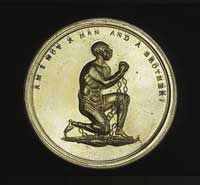Joseph Knight, ( b. c.1753)
 Joseph Knight was born in west Africa, where he was captured and sold to a Captain Knight. He sold him in Jamaica, aged about 13, to John Wedderburn, in c.1766. Wedderburn returned to Scotland in 1768, He employed Knight as his personal servant.
Knight was taught to read and write, and also baptized into the Kirk. According to Knight, at his baptism Wedderburn promised to free him in seven years' time ‘if he behaved well’. He further alleged that Wedderburn stated he would not free him in Scotland, because no one would employ him, but in Jamaica, along with a house and some ground, where he could live comfortably.
Joseph Knight was born in west Africa, where he was captured and sold to a Captain Knight. He sold him in Jamaica, aged about 13, to John Wedderburn, in c.1766. Wedderburn returned to Scotland in 1768, He employed Knight as his personal servant.
Knight was taught to read and write, and also baptized into the Kirk. According to Knight, at his baptism Wedderburn promised to free him in seven years' time ‘if he behaved well’. He further alleged that Wedderburn stated he would not free him in Scotland, because no one would employ him, but in Jamaica, along with a house and some ground, where he could live comfortably.
Knight met chambermaid Anne Thomson, and the couple conceived a child. Wedderburn dismissed Thomson because of her pregnancy, but gave Knight the money necessary to support her. The child died. Wedderburn refused further support, hoping Knight would break off the relationship. In March 1773, however, the couple married in Edinburgh. This precipitated a rupture between Wedderburn and Knight.
Knight wanted his wife to be re-engaged by Wedderburn, with a house provided on the estate for the couple; this was refused. Knight had read in the Edinburgh Advertiser of 3 July 1772 of Lord Mansfield's decision in the case of the former slave James Somerset. He understood this as meaning he was now free, claiming, however, that the humanity with which he had hitherto been treated led him to decide to stay with Wedderburn.
But Knight now decided to leave Wedderburn and go to Dundee, where his wife lived, to seek paid employment. On discovering this, Wedderburn, sought a warrant from the justices of the peace of Perthshire to have Knight detained as his slave. This was granted, and the justices, all of whom were closely connected through marriage with Wedderburn or each other, and all having interests in slavery, found against Knight.
Knight managed to have the issue brought before the sheriff court at Perth, where the sheriff-depute, John Swinton of Swinton, was known to be sympathetic; Swinton found
“That the State of Slavery is not recognised by the Laws of this Kingdom and is inconsistent with the principles thereof and Found that the Regulations in Jamaica concerning slaves do not extend to this Kingdom and repelled the Defender's Claim to perpetual Service.”
The next month Wedderburn appealed Swinton's decision in the court of session. The litigation lasted until 1778. Each party employed the most distinguished counsel of the day, Henry Dundas, then lord advocate, giving a particularly brilliant speech for Knight before the court.
The twelve opinions of the judges were very varied. Aware that in Somerset's case the judge had avoided giving a general view on slavery, all denied that Wedderburn could send Knight back to Jamaica against his will. Three accepted that Wedderburn had the right to Knight's services for life without wages, while Alexander Boswell, Lord Auchinleck, claimed that slavery was unchristian and that
Knight was ‘our brother; and he is a man, although not our colour’. The court accepted Swinton's judgment, although it is not clear that such a strong statement reflected their common opinion.
After the decision they disappear from the historical record, their subsequent lives and dates of death unknown, although in 2003 James Robertson published Joseph Knight, a convincing and imaginative novel based on his life, in which he supplied a satisfactory literary conclusion to this historical mystery.
Source:
The original medallion was stuck by Josiah Wedgewood in 1787 as part of the anti-slavery campaign


